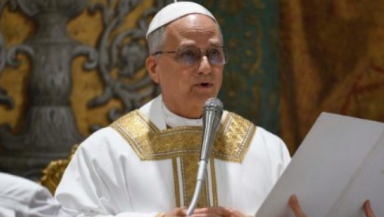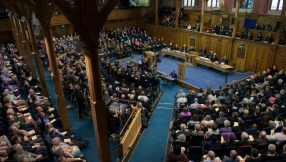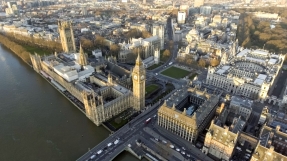
Standing beneath Michelangelo’s towering fresco of the Last Judgement, newly elected Pope Leo XIV delivered his first papal homily in the Sistine Chapel, setting a bold and unmistakable tone for his pontificate. His message: reclaim an authentic vision of Jesus Christ or risk living in a state of “practical atheism”.
It was a powerful and sobering reflection, rich in theological depth and pastoral concern. The pope cautioned against the growing trend - both outside and within the Church - of reducing Christ to a mere moral teacher, charismatic figure or inspirational role model.
“This is true not only among non-believers but also among many baptised Christians,” he warned, “who thus end up living, at this level, in a state of practical atheism.”
He went on: “Jesus is the Christ, the Son of the living God: the one Saviour, who alone reveals the face of the Father. In him, God, in order to make himself close and accessible to men and women, revealed himself to us in the trusting eyes of a child, in the lively mind of a young person and in the mature features of a man, finally appearing to his disciples after the resurrection with his glorious body.”
In those few words, Pope Leo XIV not only identified one of the gravest spiritual challenges of our age, but also called the Church to radical fidelity and renewal.
Leo’s election came as a surprise to many. Born Robert Francis Prevost, he is an American by birth and a Peruvian citizen by ministry, having served the Church in Latin America for nearly a decade. An Augustinian by formation and the former head of the Dicastery for Bishops, he brings a blend of deep intellectual grounding and pastoral sensitivity to the Chair of St Peter.
His inaugural homily was not a celebration of personal victory or institutional continuity, but a direct encounter with Scripture and the modern world. Drawing on the Gospel of Matthew, he reflected on Jesus’ question to the apostles - “Who do people say the Son of Man is?” - a question, the pope noted, that remains urgent and deeply relevant.
Leo set the scene in Caesarea Philippi, a place of political power and moral compromise. “A world,” he said, “that considers Jesus a completely insignificant person… someone with an unusual and striking way of speaking and acting.” In such a world, Jesus’ call to honesty and moral integrity becomes “irksome”, and he is ultimately cast aside.
He juxtaposed this dismissive worldly view with the fleeting admiration of the crowd - those who followed Jesus until the cost became too high. “For them, the Nazarene is not a charlatan, but an upright man, one who has courage, who speaks well and says the right things, like other great prophets in the history of Israel. That is why they follow him, at least for as long as they can do so without too much risk or inconvenience. Yet to them he is only a man, and therefore, in times of danger, during his passion, they too abandon him and depart disappointed.”
These contrasting responses, Leo noted, mirror attitudes prevalent in contemporary society: ambivalence, superficial reverence, or outright rejection of the Gospel. “Even today, there are many settings in which the Christian faith is considered absurd, meant for the weak and unintelligent,” he said. “Settings where other securities are preferred, like technology, money, success, power, or pleasure.”
What emerged clearly from the homily was the pope’s conviction that the Church must neither retreat in fear nor dilute its message for broader acceptance. Instead, it must go out with renewed missionary zeal to proclaim Christ in a world plagued by “a lack of meaning in life, the neglect of mercy, appalling violations of human dignity, [and] the crisis of the family”.
Far from being disheartened, Leo urged the faithful to engage with courage and joy. “Yet, precisely for this reason,” he said, “they are the places where our missionary outreach is desperately needed.”
Echoing the words of St Peter - “You are the Christ, the Son of the living God” - he reminded his audience that the foundation of the Church is not in temporal power but in divine revelation and personal conversion. “It is essential to do this, first of all, in our personal relationship with the Lord,” he emphasised, “in our commitment to a daily journey of conversion.”
This was not a political address or a gentle overture. It was a call to arms for the Church to be what it claims to be: the living Body of Christ in the world. His emphasis on faith as a personal, daily journey - rather than an abstract belief system - speaks directly to a generation increasingly disenchanted with institutional religion, but still yearning for spiritual truth.
In tone and substance, Pope Leo XIV’s first Mass sends a clear message: his pontificate will not shy away from the pressing spiritual and moral questions of our time. His homily, grounded in the Gospel and shaped by his pastoral experience, signals a papacy committed to clarity, authenticity, and missionary dynamism.
As British bishops reportedly celebrated his election with “overjoyed” hearts, the wider Church now watches with anticipation. Pope Leo XIV has begun not with platitudes, but with prophecy. And in doing so, he may have given the world precisely what it did not expect - an uncompromising shepherd for uncertain times.













